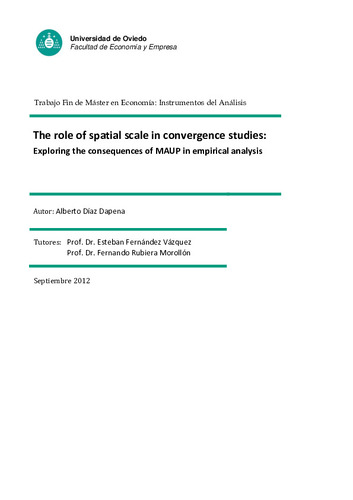The role of spatial scale in convergence studies: Exploring the consequences of MAUP in empirical analysis
Autor(es) y otros:
Director(es):
Palabra(s) clave:
Montecarlo Simulation To Test Maup In Regional Convergence Analysis
Fecha de publicación:
Serie:
Máster Universitario en Economía: Instrumentos de Análisis Económico
Resumen:
The empirical analysis of regional convergence is normally based on data collected at the administrative divisions of the territory level. However, as endogenous growth theories highlighted, large cities and central areas usually grow faster than rural and peripheral areas. So, it could be more realistic considering that the dynamics that generate economic growth take place at a smaller scale. These potential differences across sub-regional areas might be lost if the analysis is made at the NUTS II or III level (in the case of the EU countries), generating the so-called Modifiable Area Unit Problem (MAUP). The objective of this paper is to explore to which extent the MAUP bias could affect convergence analysis. By means of a Montecarlo simulation, we study how the beta-convergence results could be affected by using different levels of geographical aggregation. Several hypotheses about the generating process of local growth are considered in the simulation, according with the neo-classical and the New Economic Geography models, and the relevance of the MAUP is evaluated under different theoretical scenarios
The empirical analysis of regional convergence is normally based on data collected at the administrative divisions of the territory level. However, as endogenous growth theories highlighted, large cities and central areas usually grow faster than rural and peripheral areas. So, it could be more realistic considering that the dynamics that generate economic growth take place at a smaller scale. These potential differences across sub-regional areas might be lost if the analysis is made at the NUTS II or III level (in the case of the EU countries), generating the so-called Modifiable Area Unit Problem (MAUP). The objective of this paper is to explore to which extent the MAUP bias could affect convergence analysis. By means of a Montecarlo simulation, we study how the beta-convergence results could be affected by using different levels of geographical aggregation. Several hypotheses about the generating process of local growth are considered in the simulation, according with the neo-classical and the New Economic Geography models, and the relevance of the MAUP is evaluated under different theoretical scenarios
Colecciones
- Trabajos Fin de Máster [5283]
Ficheros en el ítem





